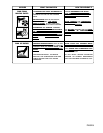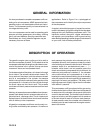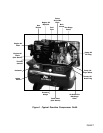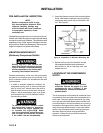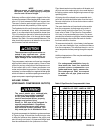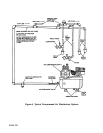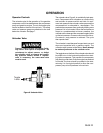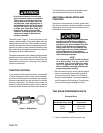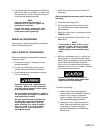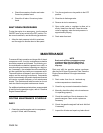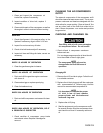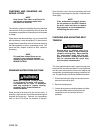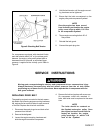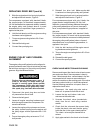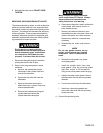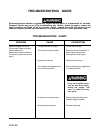
PAGE 13
4. Check the engine fuel tank level. Add fuel if
necessary.
Before starting the compressor outfit, check the
following:
5. Close the air discharge valve.
6. Set the toggle lever of the unloader valve in
the vertical position to relieve compressor
head pressure.
7. Move the control lever or choke lever to the
CHOKE position.
8. Turn the engine lever or key switch to the
ON position.
NOTE
If the engine is warm or the air tem-
perature is high, move the control
lever or choke lever away from the
CHOKE position as soon as the engine
starts.
9. Start the compressor outfit by pulling the
starter handle or by depressing the starter
button. Return the toggle lever on the unloader
valve to the horizontal position and allow
outfit run for 10 minutes without building any
pressure. Check that the unloader exhausts
air at maximum tank pressure.
If these break-in procedures are not
followed, premature pump failure may
result and void your warranty.
10.Check the following:
a. Make sure all controls are operating
correctly. Refer to the "Operator Controls"
section of this manual. A separate
gasoline engine instruction manual is
provided detailing engine operation.
b. Check all air lines, fittings and pipes for
leaks. Even minor leaks can cause the
compressor to overwork resulting in
premature breakdown or unsatisfactory
performance.
3. Periodically check the compressor outfit during
the first few days of operation to make sure
the compressor outfit is running smoothly and
all controls are operating properly.
NOTE
After the compressor has been in
operation for 2 to 3 hours, tighten the
compressor head bolts.
Torque two stage compressor head
bolts to 35 foot-pounds using a criss-
cross pattern when tightening.
BREAK-IN PROCEDURES
Perform steps 1-8 of the Daily Startup Procedures.
Open the air discharge valve.
DAILY STARTUP PROCEDURES
Perform the following checks before starting the
compressor outfit.
1. Ensure that nothing is blocking the belt
guard air openings.
2. Pull the ring on the safety valve to make
sure the valve moves freely and smoothly.
3. Check the engine and compressor oil levels.
Add oil if necessary.
Gasoline is extremely flammable and
explosive. Refuel in a well ventilated
area with engine stopped. Allow engine
to cool before refueling.
Do not smoke or allow flames or sparks in
the area where the engine is refueled or
where gasoline is stored.
Do not overfill the tank and make sure
the filler cap is securely closed after
refueling. Be careful not to spill fuel
when refueling. Fuel vapor or spilled
fuel may ignite. If any fuel is spilled,
make sure the area is dry before
starting the engine.



